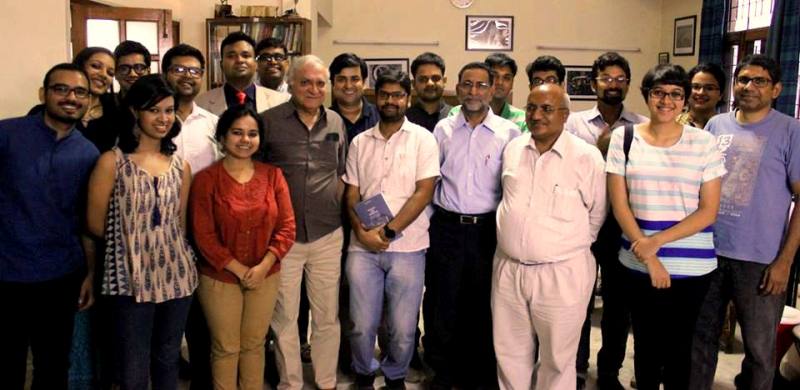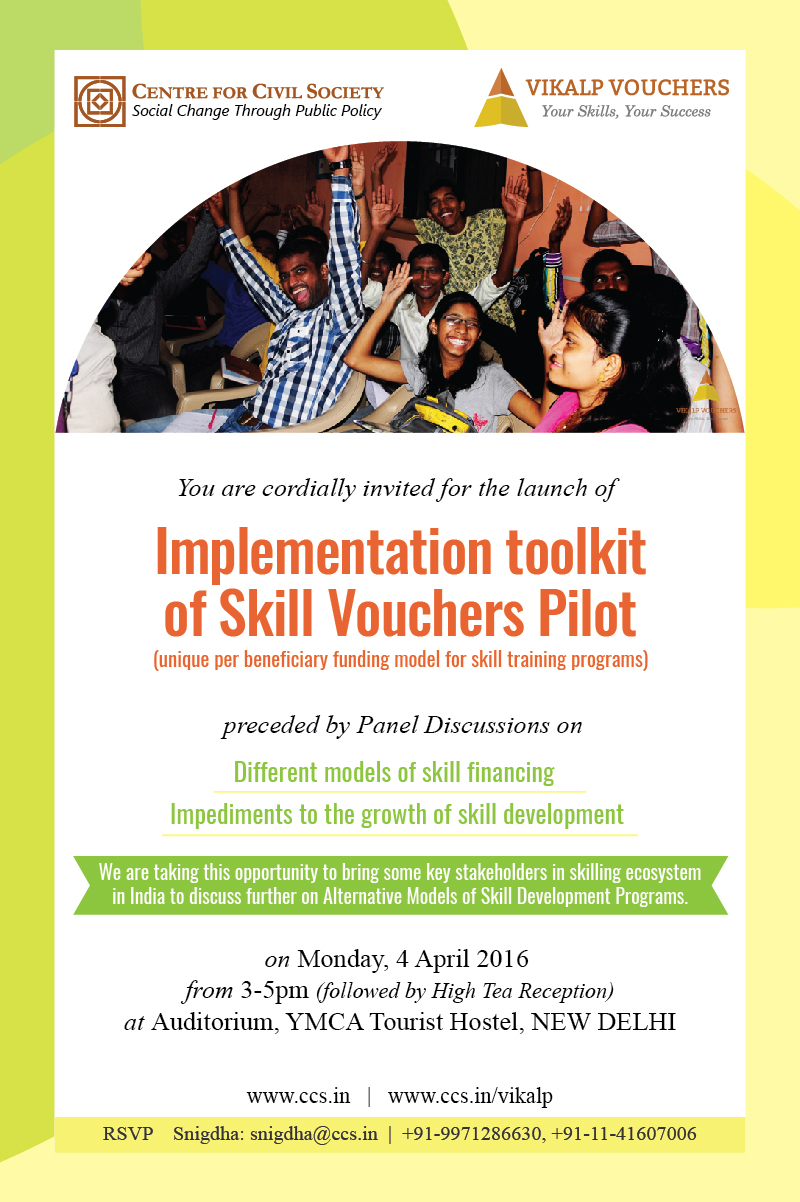You are here
Dialogues
Launch of Delhi Citizens' Handbook 2016 by Mr. Manish Sisodia
To download Delhi Citizens' Handbook 2016 click here.
Centre for Civil Society takes pleasure in inviting for the launch of Delhi Citizens' Handbook 2016 by Mr. Manish Sisodia, Deputy Chief Minister of Delhi, and a panel discussion on the theme “Jann ki Baat: A Citizen’s Perspective” on 16 August at Lecture Hall 2, India International Centre (Annexe), Max Mueller Marg, New Delhi. Request you to confirm your participation by registering here.
The Delhi Citizens' Handbook features research papers assessing the impact and relevance of policies that shape the lives of ordinary citizens in the national capital on eight core areas of urban governance: Trade & Commerce, Education, Health, Water, Urbanization, Power, Governance, and Environment, and is envisioned as a critical resource for productive public intervention and for ensuring an informed discussion on achieving effective and accountable governance.
The panel discussion will be centered on exploring ways to address policy shortcomings in areas most crucial for decent urban living, and recommendations on how to mitigate their adverse implications for ordinary citizens and will consider recent policy innovations such as the Mohalla Clinics and Delhi Solar Energy Policy 2015, as well vulnerability assessment to water supply shocks, etc.
Agenda of the event
| 5:00-5:10pm | - | Introduction by CCS and Welcome Remarks by Dr Ronald Meinardus, Friedrich Naumann Foundation |
| 5:10-5:50pm | - | Panel Discussion 'Jann ki Baat: A citizens' perspective on urban governance in Delhi' |
| 6:00-6:20pm | - | Launch of the Handbook and Keynote Address by the Chief Guest Mr Manish Sisodia, Deputy Chief Minister, New Delhi |
| 6:20-7:20pm | - | Presentation by researchers; 7 minutes pitch each on 8 themes |
| 7:20-7:30pm | - | Closing Remarks and Vote of Thanks |
| 7:30-8:00pm | - | High Tea |
The Delhi Citizen’s Handbook 2016 emerges from an intensive six-week internship program Researching Reality initiated by Centre for Civil Society. An effort to identify and address lacunas in everyday governance, Researching Reality offers intensive training in research and public policy to undergraduate and graduate students across various disciplines. Over the course of the internship, interns are expected to draft research papers that rely on primary and secondary data. Interns conduct an analysis of the feasibility, impact and outcomes of various policies. This is achieved through engagement with modular legislations and relevant literature, interaction with key stakeholders, and extensive field surveys. This includes the study of various agencies, boards, corporations, departments, schemes and programs of the state governments and Municipal Corporations; evaluating existing systems to recommend sustainable and long-term policy improvements in the functioning of government structures. Each year, interns identify core areas of governance and assess the efficacy of prevailing institutions and propose policy recommendations. The Delhi Citizen’s Handbook 2016 focuses on:
- Trade & Commerce: The relevance and reach of the Delhi Shops and Establishments Act (1956)
- Education: The operation of School Management Committees (SMCs) under the Directorate of Education
- Health: The emergence and functioning of “Mohalla Clinics” in Delhi and community participation in preventive efforts
- Water: Citizen Vulnerability Assessment to water supply shocks and the hazards of raw-water extraction
- Urbanization: Cost Analysis of a unit of Jhuggi Jhopri and a review of the Delhi Rent Control Act, 1958
- Power: The cost-benefits and receptivity towards the Delhi Solar Policy 2016 in city households
- Governance: Accuracy and Consistency of Information Displayed under RTI in the websites of Department of Health and Family Welfare, Department of Education, Delhi Jal Board, Delhi Commission for Women, Delhi Transportation Commission and Directorate of Vigilance
- Environment: Assessment of five Urban Local Bodies in meeting the targets for Swacch Bharat Mission with respect to open defecation and public urination
Policy Round Table for Parliamentarians on New Education Policy
Centre for Civil Society (CCS) organizes a regular policy round table event which acts as a platform for interaction between policy makers and civil society members to discuss and debate key policy issues. The current event focused on the New Education Policy.
Read the summary report here and access images of the event here.
Workshop on Education Policy for Journalists
Background:
Ensuring quality education to all is the key to take India into league of superpowers. Improving state of education is furthermore important to the entire world as every sixth human on planet earth happens to be from India. Various studies and reports present struggling state of education in country. In this regard, it is very important to set the policy framework right, guiding provisioning and delivering education.
Ministry of Human Resource and Development (MHRD), Government of India is working on developing New Education Policy (NEP). The last NEP was brought out in 1986. MHRD aims to make India a knowledge superpower by equipping students with the necessary skills and knowledge to eliminate the shortage of manpower. The objective of the upcoming NEP therefore is to meet the changing needs of quality education, innovation and research. Drafting national level education policy is an exercise that takes place once in two to three decades and would decide the future of educational landscape in the country.
Media plays a very important role in highlighting the achievements and challenges of policy outcome. While the new education policy is being framed, it requires informed reporting by media. The more informed journalism would decide the direction of education policy focus. In this regard, Centre for Civil Society (CCS) is organizing a workshop on education policy for senior journalists.
Workshop:
The two-day long workshop will focus on various aspects of education: philosophy, policy and practice. The workshop will be organized at a suitable location which would be ideally not more than 6 to 8 hours’ drive from Delhi. It will have thematic sessions to give detailed overview of education sector to identify merits and challenges. Sessions would be a mix of reading groups, expert presentations, interactive sessions and group discussions. The goal of the course is to equip journalists with the tools they need to understand and evaluate education policy to gauge short term and long term consequences.
The program enables journalists to distinguish between the intentions of policies and their actual results and to uncover the unintended consequences of actions and policies that are usually overlooked by others. By honing journalists’ abilities to reveal the root causes of problems and unseen consequences of policies, workshop will offers media professionals a competitive advantage to their reporting, unconventional angles and story ideas, and an analytical edge to their writing.
Participation:
The workshop is exclusively designed for journalists who have been covering education at national or state level. The ideal candidates would be senior journalists who have been covering education for around 2 to 5 years and have deep interest in understanding landscape of school education in India. Participation to the workshop is on invitation basis only.
Workshop Fee:
The workshop is on invitation basis only. The entire expenses of workshop including travel, stay, meals and study material are covered by CCS.
To read the report on workshop, click here.
Liberty Connect: CCS Alumni Meet in Delhi

CCS Alumni—join us for the first alumni meet of the year at the CCS office in Delhi! We begin with a talk on “The Mind of the Indian Liberal” by Hindol Sengupta, Editor-at-Large at Fortune India, followed by high tea.
Hindol specializes in writing on public policy and the political economy, entrepreneurship and the business of luxury. He has written extensively about the economic histories of India's Congress Party and the Bharatiya Janata Party, and infrastructure, energy and environment policies in India. He has extensive experience in in-depth reporting from Pakistan and other neighbouring countries.
Today, our alumni from across over a 100 programs conducted in policy research and training, form a strong cohort of individuals passionate about a society that promotes Choice and Accountability. If you are a graduate of our Internships, or the LSS, ISPP or ìpolicy courses – Register below for the meet up!
For more information, contact Manasi Bose (alumni@ccs.in | +91 9810772964).
Vikalp: Accelerating skills training through voucher
To read the event report click here. To see media coverage, click here. |
|
CCS is bringing some key stakeholders from the skilling ecosystem together to discuss Alternative Models of Skill Development Programs. Join us for the launch of the Vikalp Implementation Toolkit and panel discussions on:
Download detailed agenda. See details of panelists. To mark your presence, RSVP to snigdha@ccs.in. |



